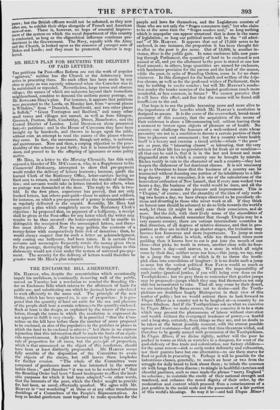MR. HILL'S PLAN FOR, SECURING THE DELIVERY OF PAID LETTERS.
TIIE petitions fur Post-office Reform are not the work of popular "agitators," neither has the Church or the Aristocracy been active in procuring them. No such effort has been made by any class or party as was recently witnessed when the Corn-law was to be maintained or repealed. Nevertheless, large towns and obscure villages, the names of which are unknown beyond their immediate neighbourhood, combine to demand the uniform penny postage, on Mr. ROWLAND HILL'S plan. For instance, it appears that petitions were presented to the Lords, on Monday last, from "several places in Wiltshire," from " Dunwich, Southwold, and two other places in Suffolk," "Great Torrington anti Redford," and many other small towns and villages not named, as well as from Glasgow, Greenock, Preston, Bath, Cambridge, Dover, Manchester, and the Central District of London. Lord Bnotiensle alone presented forty-six petitions : and in the House of Commons they have been brought up by hundreds, and thrown in heaps upon the table, without even an attempt to read the names of the places whence they came. In fact, the movement, though not noisy, is national, and spontaneous. Now and then, a carping objection to the prac- ticability of the scheme is put forth ; but it is immediately beaten down, and proved to be the offspring of ignorance or some paltry motive.
Mr. in a letter to the Morning Chronicle, has this week exposed a blunder of Mr. M'Cur,Loen, who, in a Supplement to his Commercial Dictionary, attempted to show that pre-payment would render the delivery of letters insecure ; because, quoth the learned Clerk of the Stationery Office, letter-carriers having no fixed sum to return, would save themselves the trouble of distribu- tion; and servants would take in letters intended for others, when no postage was demanded at the door. The reply to this is two- fold. In the first place, experience has proved, that not only franked letters, but others post-paid—those to sailors and soldiers, for instance, on which a pre-payment of a penny is demanded—are as regularly delivered as the unpaid. Secondly, Mr. HILL had suggested a plan which completely meets the Stationery Clerk's objection : he proposed that, on payment of a halfpenny, a receipt shall be given at the Post-office for any letter which the writer may require to be thus secured : the letter-carriers will be unable to distinguish the reccipted from the unreceipted letters, and there-
fore must deliver all. Now he may purloin the contents of a
money-letter with comparatively little risk of detection : then, he would always suspect that for such a letter an acknowledgment, only costing one halfpenny, had been taken. It is certain that servants and messengers frequently retain the money given them for the postage, destroying the letters ; but the temptation to this dishonesty would not exist under the system of universal pre-pay- ment. The security for the delivery of letters would therefore be greater were Mr. Hix.e's plan adopted.


























 Previous page
Previous page